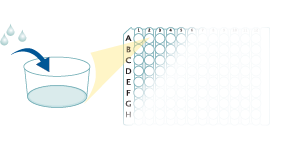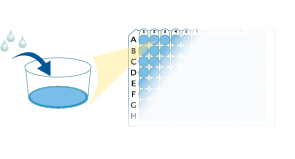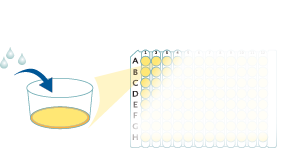Human Endoglin/CD105 Quantikine ELISA Kit Summary
Product Summary
Precision
Cell Culture Supernates, Serum, EDTA Plasma, Heparin Plasma
| Intra-Assay Precision | Inter-Assay Precision | |||||
|---|---|---|---|---|---|---|
| Sample | 1 | 2 | 3 | 1 | 2 | 3 |
| n | 20 | 20 | 20 | 40 | 40 | 40 |
| Mean (ng/mL) | 0.617 | 1.67 | 3.14 | 0.659 | 1.8 | 3.47 |
| Standard Deviation | 0.017 | 0.053 | 0.094 | 0.044 | 0.117 | 0.22 |
| CV% | 2.8 | 3.2 | 3 | 6.7 | 6.5 | 6.3 |
Recovery
The recovery of Endoglin spiked to levels throughout the range of the assay was evaluated in cell culture media.
| Sample Type | Average % Recovery | Range % |
|---|---|---|
| Cell Culture Media (n=4) | 101 | 92-111 |
Linearity
Scientific Data
Product Datasheets
Preparation and Storage
Background: Endoglin/CD105
Endoglin (CD105) is a transmembrane type III receptor for TGF-beta superfamily ligands and plays an important role in smooth muscle differentiation, angiogenesis, and neovascularization. It is highly expressed on proliferating vascular endothelial cells, chondrocytes, and syncytiotrophoblasts of term placenta. Human Endoglin haploinsufficiency can a cause the vascular disorder, hereditary hemorrhagic telangiectasia type I. Elevated levels of anti-angiogenic soluble Endoglin contribute to pathogenicity in preeclampsia. Endoglin associates with the receptors TGF-beta RII, Activin RIIA or RIIB, BMPR-IA/ALK-3, or BMPR-IB/ALK6 and enhance binding of Activin A, BMP-2, -7, -9, TGF-beta 1, or TGF-beta 3. Endoglin can either enhance or inhibit signaling through these receptor complexes.
Assay Procedure
Refer to the product- Prepare all reagents, standard dilutions, and samples as directed in the product insert.
- Remove excess microplate strips from the plate frame, return them to the foil pouch containing the desiccant pack, and reseal.
- Add 100 µL of Assay Diluent to each well.
- Add 50 µL of Standard, control, or sample to each well. Cover with a plate sealer, and incubate at room temperature for 2 hours on a horizontal orbital microplate shaker.
- Aspirate each well and wash, repeating the process 3 times for a total of 4 washes.
- Add 200 µL of Conjugate to each well. Cover with a new plate sealer, and incubate at room temperature for 2 hours on the shaker.
- Aspirate and wash 4 times.
- Add 200 µL Substrate Solution to each well. Incubate at room temperature for 30 minutes on the benchtop. PROTECT FROM LIGHT.
- Add 50 µL of Stop Solution to each well. Read at 450 nm within 30 minutes. Set wavelength correction to 540 nm or 570 nm.





Citations for Human Endoglin/CD105 Quantikine ELISA Kit
R&D Systems personnel manually curate a database that contains references using R&D Systems products. The data collected includes not only links to publications in PubMed, but also provides information about sample types, species, and experimental conditions.
42
Citations: Showing 1 - 10
Filter your results:
Filter by:
-
Alteration in sB7-H4 Serum Levels and Placental Biomarker Expression after Therapeutic Plasma Exchange in Early-Onset Preeclampsia Patients
Authors: Duan, L;Ma, Y;Reisch, B;Hadrovic, E;Mach, P;Kimmig, R;Jahn, M;Köninger, A;Iannaccone, A;Gellhaus, A;
International journal of molecular sciences
Species: Human
Sample Types: Serum
-
A Novel Dual-Function Redox Modulator Relieves Oxidative Stress and Anti-Angiogenic Response in Placental Villus Explant Exposed to Hypoxia-Relevance for Preeclampsia Therapy
Authors: Pintye, D;Sziva, RE;Mastyugin, M;Young, BC;Jacas, S;Török, M;Salahuddin, S;Jagtap, P;Southan, GJ;Zsengellér, ZK;
Biology
Species: Human
Sample Types: Cell Culture Supernates
-
Human umbilical cord mesenchymal stem cell-derived extracellular vesicles loaded with TFCP2 activate Wnt/?-catenin signaling to alleviate preeclampsia
Authors: Yang, Z;Jia, X;Deng, Q;Luo, M;Hou, Y;Yue, J;Mei, J;Shan, N;Wu, Z;
International immunopharmacology
Species: Human
Sample Types: Serum
-
Vasoactive Soluble Endoglin: A Novel Biomarker Indicative of Reperfusion after Cerebral Large-Vessel Occlusion
Authors: A Haarmann, C Vollmuth, AM Kollikowsk, PU Heuschmann, M Pham, G Stoll, H Neugebauer, MK Schuhmann
Cells, 2023-01-11;12(2):.
Species: Human
Sample Types: Plasma
-
Obstructive Sleep Apnea Is Associated With Late-Onset Preeclampsia in Overweight Pregnant Women in Korea
Authors: G Ryu, YM Kim, KE Lee, SJ Choi, SD Hong, YG Jung, SY Oh, HY Kim
Journal of Korean Medical Science, 2023-01-09;38(2):e8.
Species: Human
Sample Types: Serum
-
Similar Pro- and Antiangiogenic Profiles Close to Delivery in Different Clinical Presentations of Two Pregnancy Syndromes: Preeclampsia and Fetal Growth Restriction
Authors: W Dymara-Kon, M Laskowska, E Grywalska, A Hymos, A B?a?ewicz, B Leszczy?sk
International Journal of Molecular Sciences, 2023-01-04;24(2):.
Species: Human
Sample Types: Serum
-
The Relationship between Angiogenic Factors and Energy Metabolism in Preeclampsia
Authors: A Abascal-Sa, M Duque-Alco, V Fioravantt, E Antolín, E Fuente-Lue, M Haro, MP Ramos-Álva, G Perdomo, JL Bartha
Nutrients, 2022-05-23;14(10):.
Species: Human
Sample Types: Serum
-
Placental lesions and differential expression of pro-and anti-angiogenic growth mediators and oxidative DNA damage marker in placentae of Ghanaian suboptimal and optimal health status pregnant women who later developed preeclampsia
Authors: EO Anto, DA Coall, EA Asiamah, OO Afriyie, O Addai-Mens, YA Wiafe, W Owiredu, C Obirikoran, ME Annani-Ako, NA Titiloye, E Adua, E Acheampong, EA Adu, S Opoku, AO Anto, A Tawiah, Y Wang, W Wang
PLoS ONE, 2022-03-21;17(3):e0265717.
Species: Human
Sample Types: Plasma
-
High Soluble Endoglin Levels Affect Aortic Vascular Function during Mice Aging
Authors: I Nejmanová, B Vitverová, S Eissazadeh, K Tripská, IC Igreja Sa, R Hyšpler, I N?me?kova, M Pericacho, P Nachtigal
Journal of cardiovascular development and disease, 2021-12-04;8(12):.
Species: Human
Sample Types: Whole Blood
-
Generation of a Soluble Form of Human Endoglin Fused to Green Fluorescent Protein
Authors: L Ruiz-Llore, MC Vega, FJ Fernández, C Langa, NW Morrell, PD Upton, C Bernabeu
International Journal of Molecular Sciences, 2021-10-19;22(20):.
Species: Human
Sample Types: Cell Culture Supernates
-
Pregnancy-Induced High Plasma Levels of Soluble Endoglin in Mice Lead to Preeclampsia Symptoms and Placental Abnormalities
Authors: L Pérez-Roqu, E Núñez-Góme, A Rodríguez-, C Bernabéu, JM López-Novo, M Pericacho
International Journal of Molecular Sciences, 2020-12-26;22(1):.
Species: Human
Sample Types: Plasma
-
Circulating miRNAs Associated with Dysregulated Vascular and Trophoblast Function as Target-Based Diagnostic Biomarkers for Preeclampsia
Authors: S Kim, M Park, JY Kim, T Kim, JY Hwang, KS Ha, MH Won, S Ryoo, YG Kwon, YM Kim
Cells, 2020-08-31;9(9):.
Species: Human
Sample Types: Serum
-
Permissive microbiome characterizes human subjects with a neurovascular disease cavernous angioma
Authors: SP Polster, A Sharma, C Tanes, AT Tang, P Mericko, Y Cao, J Carrión-Pe, R Girard, J Koskimäki, D Zhang, A Stadnik, SG Romanos, SB Lyne, R Shenkar, K Yan, C Lee, A Akers, L Morrison, M Robinson, A Zafar, K Bittinger, H Kim, JA Gilbert, ML Kahn, L Shen, IA Awad
Nat Commun, 2020-05-27;11(1):2659.
Species: Human
Sample Types: Plasma
-
Sleep-disordered breathing does not impact maternal outcomes in women with hypertensive disorders of pregnancy
Authors: DL Wilson, ME Howard, AM Fung, FJ O'Donoghue, M Barnes, M Lappas, SP Walker
PLoS ONE, 2020-04-27;15(4):e0232287.
Species: Human
Sample Types: Serum
-
Potential Role of Circulating Endoglin in Hypertension via the Upregulated Expression of BMP4
Authors: E Gallardo-V, L Gamella-Po, L Perez-Roqu, JL Bartha, I Garcia-Pal, JI Casal, JM López-Novo, M Pericacho, C Bernabeu
Cells, 2020-04-16;9(4):.
Species: Human
Sample Types: Cell Culture Supernates
-
Hydroxychloroquine Mitigates the Production of 8-Isoprostane and Improves Vascular Dysfunction: Implications for Treating Preeclampsia
Authors: RA Rahman, P Murthi, H Singh, S Gurungsing, B Leaw, JC Mockler, R Lim, EM Wallace
Int J Mol Sci, 2020-04-03;21(7):.
Species: Human
Sample Types: Placenta
-
MMP-12, Secreted by Pro-Inflammatory Macrophages, Targets Endoglin in Human Macrophages and Endothelial Cells
Authors: M Aristorena, E Gallardo-V, M Vicen, M de Las Cas, L Ojeda-Fern, C Nieto, FJ Blanco, AC Valbuena-D, LM Botella, P Nachtigal, AL Corbi, M Colmenares, C Bernabeu
Int J Mol Sci, 2019-06-25;20(12):.
Species: Human
Sample Types: Cell Culture Supernates
Applications: Western Blot -
Sulphadoxine-pyrimethamine plus azithromycin may improve birth outcomes through impacts on inflammation and placental angiogenesis independent of malarial infection
Authors: HW Unger, AP Hansa, C Buffet, W Hasang, A Teo, L Randall, M Ome-Kaius, S Karl, AA Anuan, JG Beeson, I Mueller, SJ Stock, SJ Rogerson
Sci Rep, 2019-02-19;9(1):2260.
Species: Human
Sample Types: Plasma
-
LIFR increases the release of sEng via the up-regulation of MMP14 expression in PE
Authors: H Li, J Yao, X Chang, J Wu, T Duan, K Wang
Reproduction, 2018-01-23;0(0):.
Species: Human
Sample Types: Plasma
-
Circulating soluble endoglin modifies the inflammatory response in mice
Authors: L Ruiz-Remol, C Ollauri-Ib, L Pérez-Roqu, E Núñez-Góme, F Pérez-Barr, JM López-Novo, M Pericacho, A Rodríguez-
PLoS ONE, 2017-11-16;12(11):e0188204.
Species: Mouse
Sample Types: Plasma
-
Endothelial Dysfunction in Severe Preeclampsia is Mediated by Soluble Factors, Rather than Extracellular Vesicles
Authors: M O'Brien, D Baczyk, JC Kingdom
Sci Rep, 2017-07-19;7(1):5887.
Species: Human
Sample Types: Tissue Culture Supernates
-
Lipoprotein apheresis in the treatment of dyslipidaemia - the Czech Republic experience
Authors: V Bláha, M Bláha, M Lánská, D Solichová, L Kujovská K, E Havel, P Vyroubal, Z Zadák, P Žák, L Sobotka
Physiol Res, 2017-04-05;66(0):S91-S100.
Species: Human
Sample Types: Serum
-
Plasma Soluble Endoglin Levels Are Inversely Associated With the Severity of Coronary Atherosclerosis
Authors: Yukihiko Momiyama
Arterioscler. Thromb. Vasc. Biol., 2016-10-27;0(0):.
Species: Human
Sample Types: Plasma
-
Association between Placental Lesions, Cytokines and Angiogenic Factors in Pregnant Women with Preeclampsia
Authors: Ingrid C Weel
PLoS ONE, 2016-06-17;11(6):e0157584.
Species: Human
Sample Types: Tissue Homogenates
-
High soluble endoglin levels do not induce endothelial dysfunction in mouse aorta.
Authors: Nemeckova I, Serwadczak A, Oujo B, Jezkova K, Rathouska J, Fikrova P, Varejckova M, Bernabeu C, Lopez-Novoa J, Chlopicki S, Nachtigal P
PLoS ONE, 2015-03-13;10(3):e0119665.
Species: Mouse
Sample Types: Plasma
-
Persistent urinary podocyte loss following preeclampsia may reflect subclinical renal injury.
Authors: White W, Garrett A, Craici I, Wagner S, Fitz-Gibbon P, Butters K, Brost B, Rose C, Grande J, Garovic V
PLoS ONE, 2014-03-24;9(3):e92693.
Species: Human
Sample Types: Serum
-
Plasma Concentrations of Soluble Endoglin versus Standard Evaluation in Patients with Suspected Preeclampsia.
Authors: Rana S, Cerdeira A, Wenger J, Salahuddin S, Lim K, Ralston S, Thadhani R, Karumanchi S
PLoS ONE, 2012-10-26;7(10):e48259.
Species: Human
Sample Types: Plasma
-
A phase I trial and pharmacokinetic study of sorafenib in children with refractory solid tumors or leukemias: a Children's Oncology Group Phase I Consortium report.
Authors: Widemann B, Kim A, Fox E, Baruchel S, Adamson P, Ingle A, Glade Bender J, Burke M, Weigel B, Stempak D, Balis F, Blaney S
Clin Cancer Res, 2012-09-07;18(21):6011-22.
Species: Human
Sample Types: Plasma
-
MMP-15 Is Upregulated in Preeclampsia, but Does Not Cleave Endoglin to Produce Soluble Endoglin.
Authors: Kaitu'u-Lino TJ, Palmer K, Tuohey L, Ye L, Tong S
PLoS ONE, 2012-06-29;7(6):e39864.
Species: Human
Sample Types: Cell Culture Supernates
-
Circulating soluble endoglin levels in pregnant women in Cameroon and Malawi--associations with placental malaria and fetal growth restriction.
Authors: Silver KL, Conroy AL, Leke RG, Leke RJ, Gwanmesia P, Molyneux ME, Wallace DT, Rogerson SJ, Kain KC
PLoS ONE, 2011-09-22;6(9):e24985.
Species: Human
Sample Types: Plasma
-
Prognostic significance of the angiogenic factors angiogenin, endoglin and endostatin in cervical cancer.
Authors: Landt S, Mordelt K, Schwidde I, Barinoff J, Korlach S, Stoblen F, Lichtenegger W, Sehouli J, Kummel S
Anticancer Res., 2011-08-01;31(8):2651-5.
Species: Human
Sample Types: Serum
-
Phase I and pharmacokinetic study of sunitinib in pediatric patients with refractory solid tumors: a children's oncology group study.
Authors: Dubois SG, Shusterman S, Ingle AM, Ahern CH, Reid JM, Wu B, Baruchel S, Glade-Bender J, Ivy P, Grier HE, Adamson PC, Blaney SM
Clin. Cancer Res., 2011-06-20;17(15):5113-22.
Species: Human
Sample Types: Plasma
-
Effect of smoking on circulating angiogenic factors in high risk pregnancies.
Authors: Jeyabalan A, Powers RW, Clifton RG, Van Dorsten P, Hauth JC, Klebanoff MA, Lindheimer MD, Sibai B, Landon M, Miodovnik M, Caritis S, Roberts JM, Kuller J, Cotroneo M, Kamon T, Mercer B, Ramsey R, Paul R, Rabello Y, McCart D, Mueller E, Goldenberg R, Copper R, Sorokin Y, Norman G, Millinder A, Christmas JT, McCoy S, Elder S, Elder N, Carter B, Pemberton V, Thurnau G, Meier A, Minton V, Meis P, Swain M, Moawad AH, Jones P, Iams JD, Meadows S, Brenner S, Collins B, Newman RB, Carter SG, Romero R, Sabo V, Thom E, Bain RP, MacPherson C, Johnson D, Fischer ML, McNellis D, Spong C, Catz C, Yaffe S
PLoS ONE, 2010-10-12;5(10):e13270.
Species: Human
Sample Types: Serum
-
Soluble fms-Like tyrosine kinase 1 (sFlt1), endoglin and placental growth factor (PlGF) in preeclampsia among high risk pregnancies.
Authors: Powers RW, Jeyabalan A, Clifton RG
PLoS ONE, 2010-10-11;5(10):e13263.
Species: Human
Sample Types: Serum
-
Systemic increase in the ratio between Foxp3+ and IL-17-producing CD4+ T cells in healthy pregnancy but not in preeclampsia.
Authors: Santner-Nanan B, Peek MJ, Khanam R, Richarts L, Zhu E, Fazekas de St Groth B, Nanan R
J. Immunol., 2009-11-13;183(11):7023-30.
Species: Human
Sample Types: Serum
-
A proof-of-principle gel-free proteomics strategy for the identification of predictive biomarkers for the onset of pre-eclampsia.
Authors: Blankley RT, Gaskell SJ, Whetton AD
BJOG, 2009-08-04;116(11):1473-80.
Species: Human
Sample Types: Plasma
-
Soluble endoglin modulates aberrant cerebral vascular remodeling.
Authors: Chen Y, Hao Q, Kim H, Su H, Letarte M, Karumanchi SA, Lawton MT, Barbaro NM, Yang GY, Young WL
Ann. Neurol., 2009-07-01;66(1):19-27.
Species: Human
Sample Types: Tissue Homogenates
-
Improved prediction of disease relapse after radical prostatectomy through a panel of preoperative blood-based biomarkers.
Authors: Shariat SF, Karam JA, Walz J, Roehrborn CG, Montorsi F, Margulis V, Saad F, Slawin KM, Karakiewicz PI
Clin. Cancer Res., 2008-06-15;14(12):3785-91.
Species: Human
Sample Types: Plasma
-
Preoperative plasma endoglin levels predict biochemical progression after radical prostatectomy.
Authors: Svatek RS, Karam JA, Roehrborn CG, Karakiewicz PI, Slawin KM, Shariat SF
Clin. Cancer Res., 2008-06-01;14(11):3362-6.
Species: Human
Sample Types: Plasma
-
Use of preoperative plasma endoglin for prediction of lymph node metastasis in patients with clinically localized prostate cancer.
Authors: Karam JA, Svatek RS, Karakiewicz PI, Gallina A, Roehrborn CG, Slawin KM, Shariat SF
Clin. Cancer Res., 2008-03-01;14(5):1418-22.
Species: Human
Sample Types: Plasma
-
Soluble endoglin and other circulating antiangiogenic factors in preeclampsia.
Authors: Levine RJ, Lam C, Qian C, Yu KF, Maynard SE, Sachs BP, Sibai BM, Epstein FH, Romero R, Thadhani R, Karumanchi SA
N. Engl. J. Med., 2006-09-07;355(10):992-1005.
Species: Human
Sample Types: Serum
-
Circulating endothelial cells and angiogenic serum factors during neoadjuvant chemotherapy of primary breast cancer.
Authors: Furstenberger G, von Moos R, Lucas R, Thurlimann B, Senn HJ, Hamacher J, Boneberg EM
Br. J. Cancer, 2006-02-27;94(4):524-31.
Species: Human
Sample Types: Serum
FAQs
-
Does this ELISA detect the L or S isoform of Endoglin?
Both isoforms are expected to be measured in this Endoglin ELISA. This assay recognizes the soluble, extracellular portion of the protein which is identical for the L & S isoforms. The differences between L & S Endoglin are located within the cytoplasmic region of the protein.
-
Does this ELISA detect monomeric or dimeric Endoglin?
This assay is confirmed to measure dimeric soluble Endoglin. This assay has not been evaluated for reactivity with monomeric Endoglin.
Reviews for Human Endoglin/CD105 Quantikine ELISA Kit
Average Rating: 5 (Based on 1 Review)
Have you used Human Endoglin/CD105 Quantikine ELISA Kit?
Submit a review and receive an Amazon gift card.
$25/€18/£15/$25CAN/¥75 Yuan/¥2500 Yen for a review with an image
$10/€7/£6/$10 CAD/¥70 Yuan/¥1110 Yen for a review without an image
Filter by:
Normal, healthy plasma was in range at 10-fold dilution and showed good linearity. Concentrations in normal, healthy urine were below the standard curve at 10-fold dilution so would recommend using a lower dilution factor.








